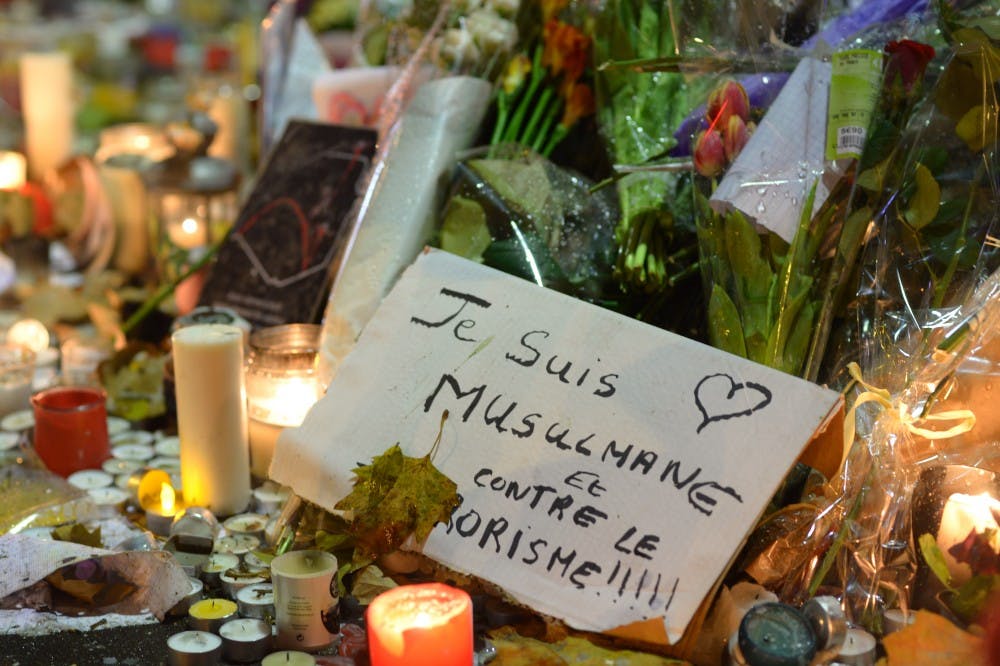There was nothing unusual about Carolyn Lutzenhiser’s Friday night. Having just enjoyed a bowlful of homemade potato soup and a glass of wine, she settled into her evening plans: a sleepover with friends.
“All of a sudden the internet and the notifications on my phone just kind of exploded,” Lutzenhiser, a sophomore studying abroad in Nantes, France, said. “I got a bunch of frantic emails and texts from our program director telling the group of us Americans that we had to reply to say we were okay.”
Lutzenhiser’s eyes were glued to her cell phone as news of the Nov. 13 terrorist attacks in Paris unfolded on social media. She is one of three UP students studying abroad in Nantes through the Institute of International Education of Students (IES). Each of these students checked in with the IES program director that night.
About 200 miles away, people in Paris were in shock after terrorist attacks killed at least 129 people and injured more than 350. Gunmen and suicide bombers targeted a concert, the French national team soccer match at the Stade de France and hubs of young Parisian nightlife between the third and eleventh arrondissements.
French president François Hollande has declared a three-month state of emergency in France, allowing authorities to restrict people’s movements and impose stricter border controls. France is also continuing airstrikes against ISIS in Syria.
“There’s been replay after replay of the video footage of the attacks. I’ve seen the puddles of blood on the roads by the cafes,” Lutzenhiser said. “I’ve heard the incessant gunfire at Bataclan and on the streets of Paris. I don’t want to see or hear those things ever again, and I only saw and heard them on television, safe at home with my host mom.”
UP’s Office of Studies Abroad made contact with all students living in Europe on Friday. Director Eduardo Contreras said the office will continue to follow U.S. State Department warnings, as well as best practice precedents set by other American universities and the National Association of International Educators.
All students who study abroad through UP are insured by Cultural Insurance Services International, which includes emergency medical evacuation and emergency political evacuation. However, according to Contreras, “the likelihood of it getting to that circumstance is pretty dire.”
Sophomore Mathieu Garcia and his twin brother, Pierre, are from Montluçon, about five hours from Paris. Garcia said that all of his friends and family are safe, and that he broke the news of the attacks to his mother, who had been asleep when they happened.
Garcia appreciates the support he has received from the Pilot community in the days following the violence.
“(My Fine Arts teacher) said he was very sorry and because he went to France before, he told me that he kind of understood,” Garcia said. “Also The Commons workers, they said they are very sorry and, ‘Is your family okay?’”
He explained that his friends in France, too, have been vocal about being supportive and accepting.
“Everybody is supporting people, especially Muslims, because some people think all Muslims are bad,” Garcia said. “So my friends are really saying that it is not Muslims.”

Political science professor Jeffrey Meiser agrees, explaining that it would be unfortunate if these attacks incited widespread prejudice, as that would be playing into ISIS’s hands.
Meiser anticipates, however, that the attack will be used by conservative forces opposing immigration policies throughout Europe.
He said the counterterrorist actions that have already begun in France will likely spread.
“I question the rhetoric of the French president, saying this is an act of war. This echoes the rhetoric of George Bush circa 2001, and I don’t know that saying ‘this is war’ is useful,” Meiser said. “The rhetoric should not inflate the threat or make ISIS seem more important than it is.”
According to Meiser, ISIS’s ultimate goal is to establish “Caliphate.” In the short term, this means using terrorism to intimidate western countries, promote themselves and gain recruits and territory. In the long term, this would amount to political control over the area covering the Islamic world and, eventually, converting the entire world to Islam.
He believes, however, that ISIS is not likely to expand drastically in the coming years. He explained that perhaps the largest unknown is whether ISIS will gain influence in Europe.
“I would say that nothing will be different in one year. In three years, I expect the problem to be different, and ISIS influence will shrink,” Meiser said. “The bigger question is will it gain more influence in Europe...But I don’t see it expanding that way either.”
For now, Garcia said the attacks won’t stifle life in France.
“Everybody is trying to smile and live like we live in France: be happy and go to drink beers outside,” Garcia said.
Malika Andrews and Luke Loranger also contributed to reporting for this story.








